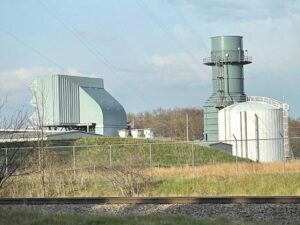
Great River Energy (GRE) has proposed to the Public Utilities Commission a “minor alteration” to its existing permit for its gas-fired power plant in Cambridge, Minnesota. Hardly “minor,” the company plans to change it to an oil-and-gas-burning “dual fuel” plant while evading full environmental review.
Environmental review for a new power plant would normally have to demonstrate all the potential environmental and human health impacts that this oil-fired power plant will cause. By contrast “minor alterations,” or changes to large electric power generating plants that do not result in significant changes to human health or the environment, are meant to be a regulatory rubber stamp where proposals do not need to go through any environmental review. However, GRE proposes changes in the plant’s internal technology, the fuel used, and the emissions profile, all of which will inherently create significant impacts to both human health and the environment. These impacts mean that GRE’s proposal is subject to a mandatory environmental review under the Minnesota Environmental Policy Act (MEPA). MEPA’s regulations clearly state that a new large electric power generating plant burning oil must be analyzed by an Environmental Impact Statement (EIS).
Public Employees for Environmental Responsibility (PEER), CURE, and Sierra Club North Star Chapter are petitioning the Minnesota Public Utilities Commission (PUC) to trigger an environmental review. By signing this petition, Minnesota residents and property owners in Minnesota can demand that the PUC put GRE’s proposal through the environmental review MEPA prescribes. Click here if you would like to review the entire petition asking the PUC for Environmental Review. Facts in the petition:

GRE’s proposed oil-burning facility is near the Rum River, a special needs school serving six local school districts, and a city park where youth and adults play sports, and enjoy playground facilities. As it is two miles out of town, its air pollution and traffic impacts may affect the entire Cambridge community—without environmental review, there is no proof that these impacts won’t be significant.
GRE is proposing to replace its Cambridge natural gas-fired power plant with a power plant that burns both diesel fuel oil and natural gas. To do this, GRE will replace existing burners with new burners and construct fuel oil storage, water storage, pipes, pumps, and controls. This project requires an amended air pollution permit from the Pollution Control Agency and an amended water appropriation permit from the Department of Natural Resources.
This construction and operation of the new facility will potentially:
- disturb soil under and around the new storage tanks, kicking up dust and causing unstudied impacts on archeological resources;
- increase truck traffic and vehicle noise;
- risk diesel spills from trucks or the storage tanks to land or waterways;
- greatly increase the potential for greenhouse gas emissions from the plant just as the state is promising to do more to address climate change; and
- cause more air pollution from increased traffic and burning fuel oil at the facility.
GRE’s application states that there will be no impacts to the environment based on a comparison to its Elk River dual-fuel power plant. However, when comparing EPA-reported emissions between Cambridge and Elk River in 2017, the oil-burning plant emitted:
4,329 times the arsenic;
37 times the cadmium;
35 times the carbon monoxide;
641 times the lead;
1,282 times the mercury;
42 times the nitrogen oxides; and
2,288 times the sulfur dioxide
Additional EPA data shows that in 2017 Elk River emitted nearly nine times as much greenhouse gasses as the Cambridge Plant, which would give this new plant an additional Social Cost of Carbon (a dollar estimate of climate damages created by the U.S. government) of $5,751,270 for one year of operation. GRE’s assurances that there will be no impacts to human health or the environment do not square with the historic emissions it has reported to regulators.

The project will likely increase diesel emissions, both from the trucks delivering diesel fuel oil to the plant and from the plant itself while in operation. Diesel exhaust has been confirmed to increase childhood asthma, and heart and lung disease, and is known to cause cancer according to numerous expert agencies. The people living near the plant are already exposed to higher levels of traffic, particulate matter, and diesel exhaust than most Minnesotans, and nearby neighbors include a significant number of people living below the poverty line. Adding a new large source of pollution to the area will harm children, special needs students, people using nearby parks, and those who are already experiencing environmental injustice. Any consideration of GRE’s proposal should analyze all the potential impacts on these people and give them a chance to speak for themselves on the record.
CURE created a one-page resource that will help you through the process and provide sample templates to choose from along with talking points. Click here for the PUC comment guide.